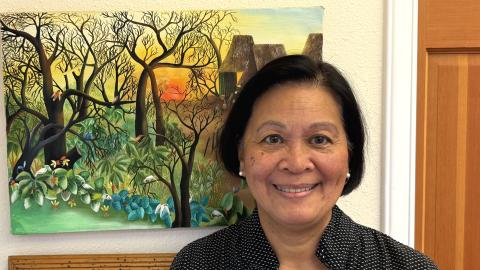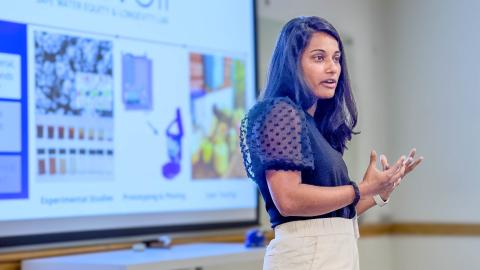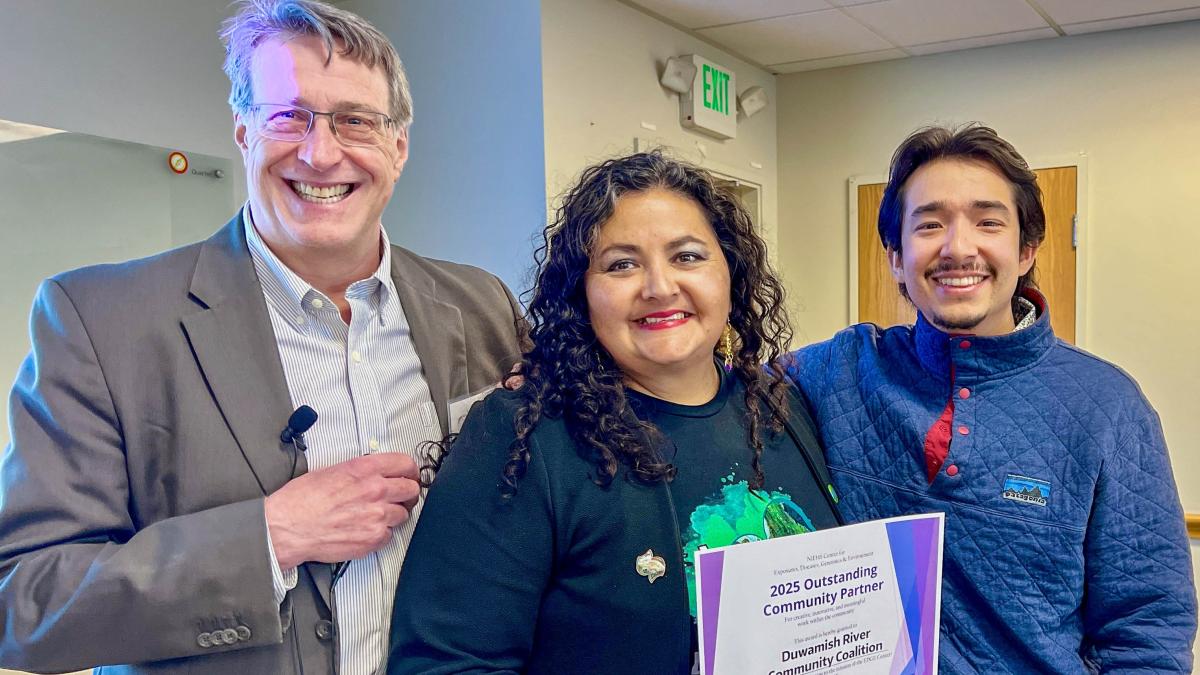
On June 4th, the University of Washington (UW) Interdisciplinary Center for Exposures, Diseases, Genomics & Environment (EDGE) hosted its annual center symposium on the UW campus in Seattle. Sixty-three people attended representing several UW departments and partner research institutions as well as agencies and community groups from the wider Seattle area. The theme for the event was “Environmental Health Sciences in a Changing Environment.”
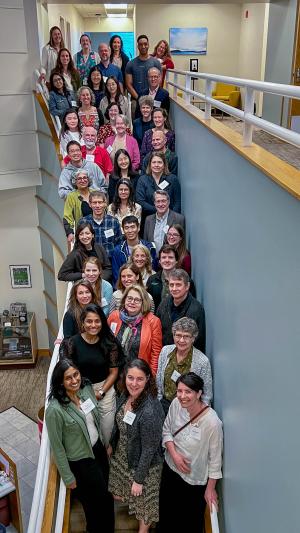
After a welcome and introduction, participants heard from three early-stage investigators.
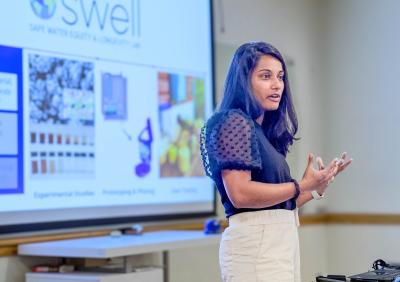
Katya Cherukumilli, an assistant professor in Human Centered Design and Engineering, presented her work evaluating university campus drinking water infrastructure.
Jonika Hash, an assistant professor in Child, Family, and Population Health Nursing, spoke about her work characterizing traffic-related air pollution exposure and epigenetic aging among under-resourced mothers and children.
Tzu-Hsin Karen Chen, an assistant professor in the UW Department of Environmental and Occupational Health Sciences (DEOHS), described her study on urban infrastructure deficiencies and extreme heat in the Mediterranean region.
Next Sheela Sathyanarayana, the EDGE Pilot Project Program Director, introduced the recipients of the four 2024 EDGE pilot grants.
Shelly Erickson, a research biologist with the Veterans Administration and research assistant professor in Gerontology, presented her work examining the effects of air pollution on traumatic brain injury.
Christine Loftus, a clinical associate professor in DEOHS, spoke about her study with Catherine Karr, a professor in DEOHS, to characterize barriers and motivations affecting people’s tendencies to protect themselves and their families from wildfire smoke in the Yakima Valley.
Karen Levy, a professor in DEOHS, presented her work with Kelsey Jesser, a clinical research assistant professor in DEOHS, collecting baseline data to determine the public health impacts of a city-wide sanitation intervention in Quelimane, Mozambique.
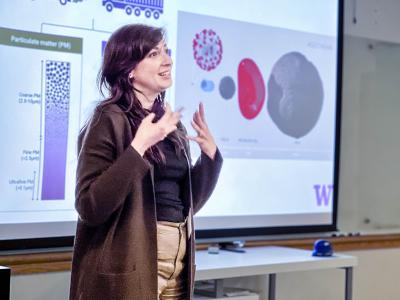
Finally, Judit Marsillach, an assistant professor in DEOHS, spoke about results from her study with Ed Kelly, a professor in DEOHS, using a novel lung-on-a-chip system to assess the effects of diesel exhaust on the barrier integrity of lung tissue.
After lunch, EDGE hosted the third session in a three-part series on Community Engaged Research titled “Emerging Best Practices in Community Engaged Research: Leveraging Research for Action (aka What is Advocacy, Anyway?)”. It was moderated by BJ Cummings, Co-Manager of Community Engagement for the EDGE Center, and featured panelists Elena Austin, an assistant professor in DEOHS; Jamie Donatuto, a clinical associate professor in DEOHS and Co-Director of the EDGE Community Engagement Core; and Morgan Hickel of UW External Affairs. Panelists shared their experience working with legislators and Hickel provided advice on how to advocate legally as a UW employee.
EDGE Director Joel Kaufman wrapped up the formal presentations for the day by passing out numerous EDGE awards and acknowledgements as follows:
2025 EDGE Pilot Grant recipients:
Joan Casey and Marissa Childs, DEOHS, for “Residential Proximity to Harmful Algal Blooms and Risk of Incident Dementia in a Southern California Electronic Health Record Cohort”
Lisa Maves, UW School of Medicine and Seattle Children's Research Institute, for “Defining Novel Gene X Environment Interactions That Lead to Embryonic Heart Defects”
Alison Paquette and Samantha Lapehn, Seattle Children's Research Institute and Center for Developmental Biology and Regenerative Medicine, for “Development of a Phthalate-Disrupted Placental Multi-Omic Network”
Katya Cherukumilli, UW Department of Human Centered Design & Engineering, for “Collectively Addressing Lead Contamination of Drinking Water in Washington State Schools”
The Most Impactful Research Award was awarded to Catherine Karr and Sheela Sathyanarayana in part for their work leading Washington cohort study sites in the National Institute of Environmental Health Sciences Environmental Influences on Child Health Outcomes (ECHO) program and the UW Pediatric and Reproductive Environmental Health Scholars K12 program.
The Public Engagement Award was awarded to Christine Loftus for her work to engage community members in the Yakima Valley on the issue of wildfire smoke.
The Outstanding Community Partner was awarded to the Duwamish River Community Coalition (DRCC) for leading multiple collaborative studies with UW including the Duwamish Valley Climate Resilience Needs Assessment (SASPER), the YES Resilience: See Solutions study, the Duwamish Air Improvement Study for Youth (DAISY), the Living With Water study and for serving on the EDGE Community Advisory Board. Paulina López, Executive Director of DRCC, and Joseph Santana, Environmental Health Equity Manager of DRCC, accepted the award.
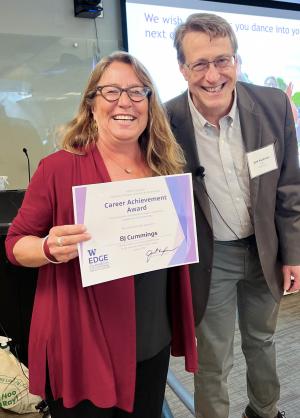
Finally The Career Achievement Award was awarded to BJ Cummings for her many accomplishments in her seven years of managing community engagement for the EDGE Center. These include developing the Research Partnership Agreement to ensure equitable partnerships between university researchers and community groups; creating the Community-Engaged Research Hub to help researchers respond to environmental health challenges in communities; producing videos to dispel myths about COVID in eight languages during the early weeks of the pandemic; and developing and delivering EDGE’s first training series on community-engaged research. She’s also been instrumental in the development and implementation of several research projects, including SASPER, YES-Resilience, DAISY, and Living With Water.
After the awards ceremony, participants of the symposium convened on an outdoor patio to celebrate Cummings’ retirement. Co-Director of Community Engagement, Nicole Errett, and Paulina López expressed their gratitude for Cummings’ devotion to her work, and many community members from both within and outside of EDGE joined to wish her a wonderful next chapter.
- Community Engagement

